人教版初二英语Unit 1 What’s the matter? Section B Period 4课件+嵌入视频(33张ppt)
文档属性
| 名称 | 人教版初二英语Unit 1 What’s the matter? Section B Period 4课件+嵌入视频(33张ppt) | 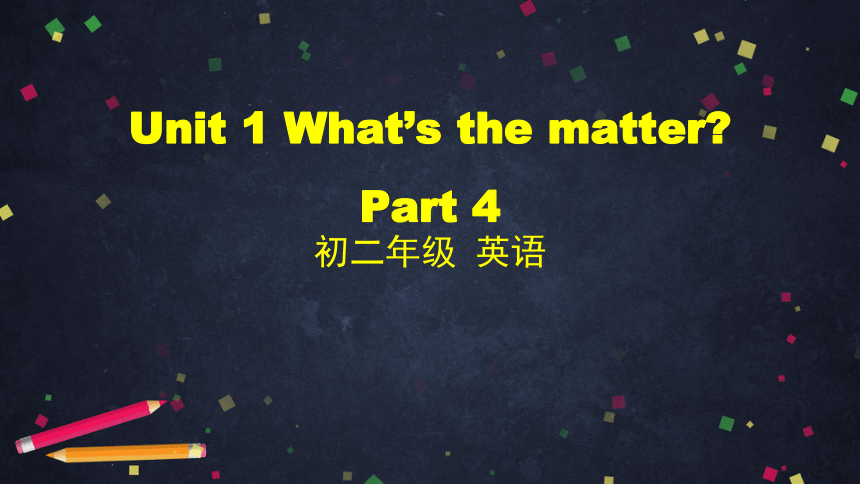 | |
| 格式 | zip | ||
| 文件大小 | 17.7MB | ||
| 资源类型 | 教案 | ||
| 版本资源 | 人教新目标(Go for it)版 | ||
| 科目 | 英语 | ||
| 更新时间 | 2020-05-02 09:38:33 | ||
图片预览

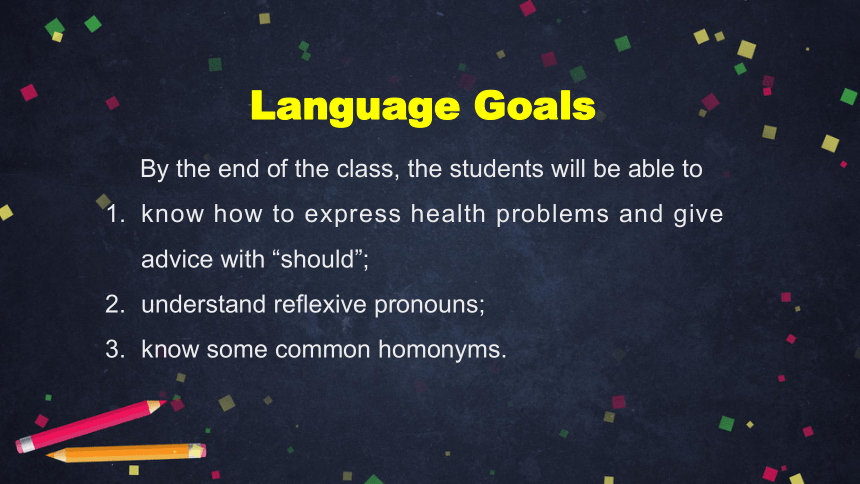
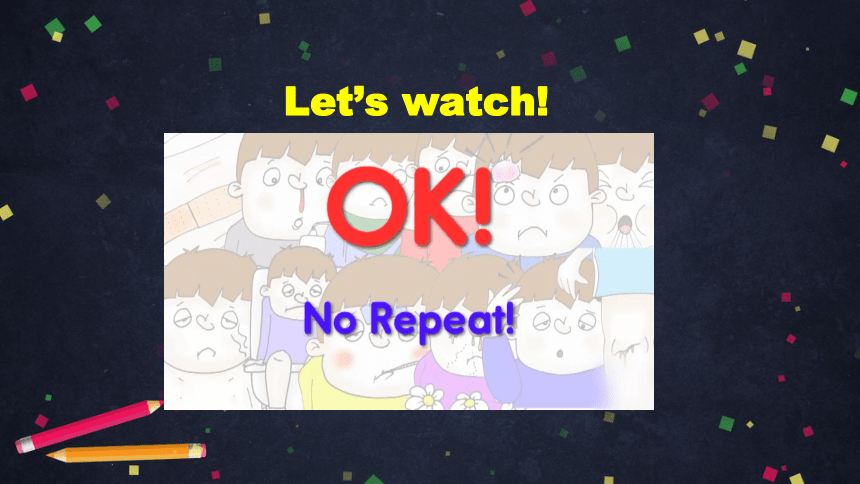
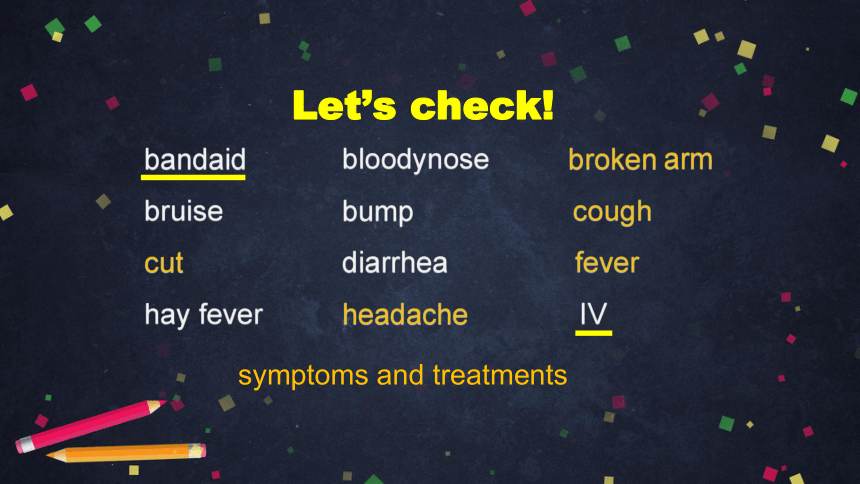
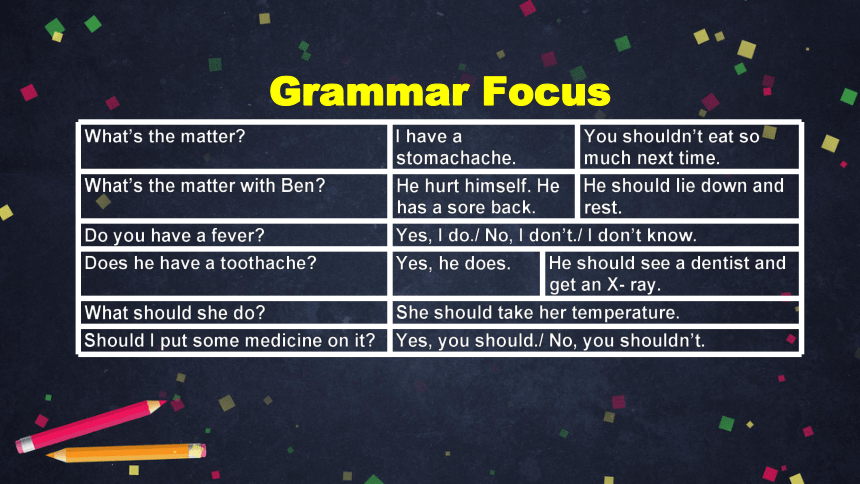
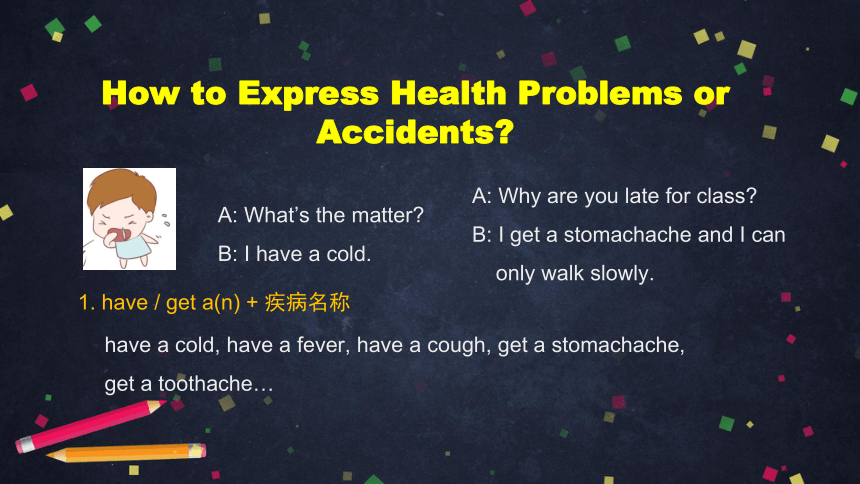
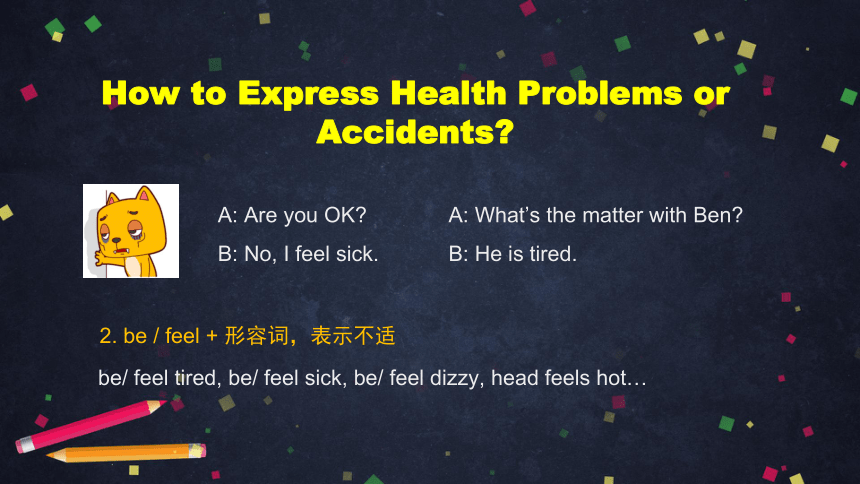
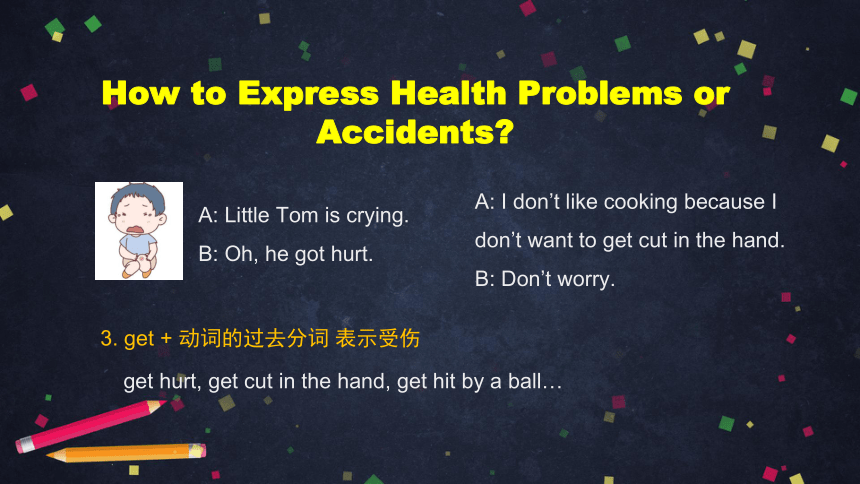
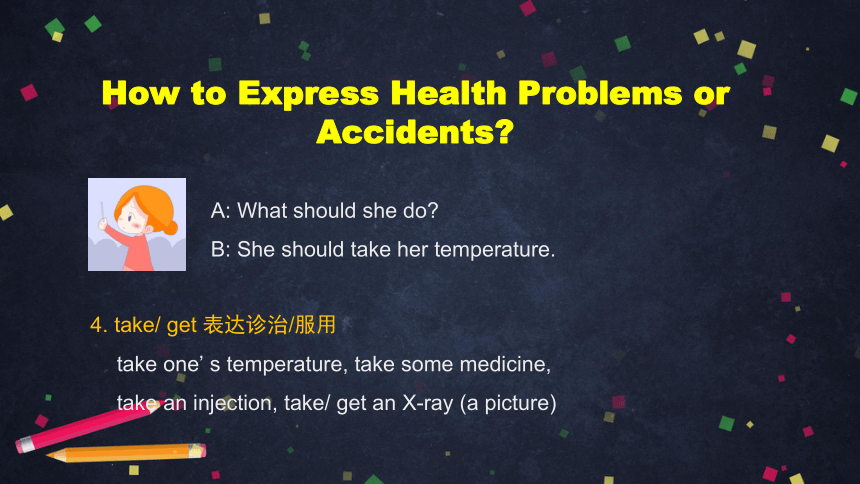
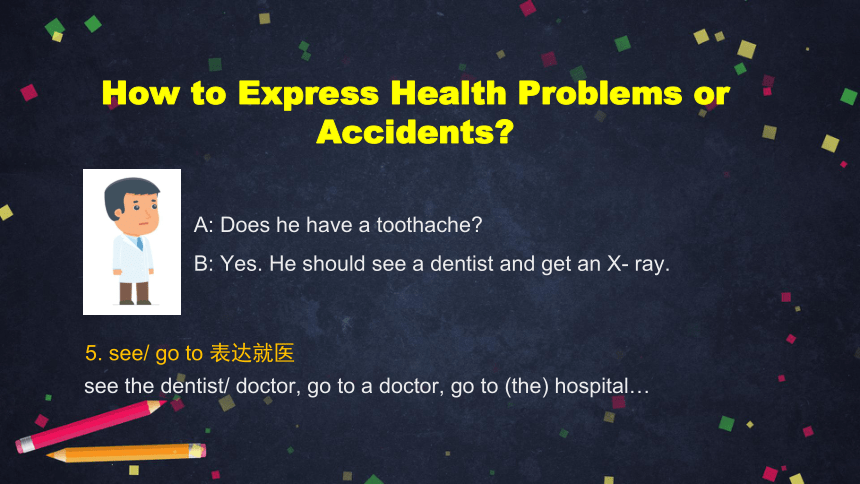
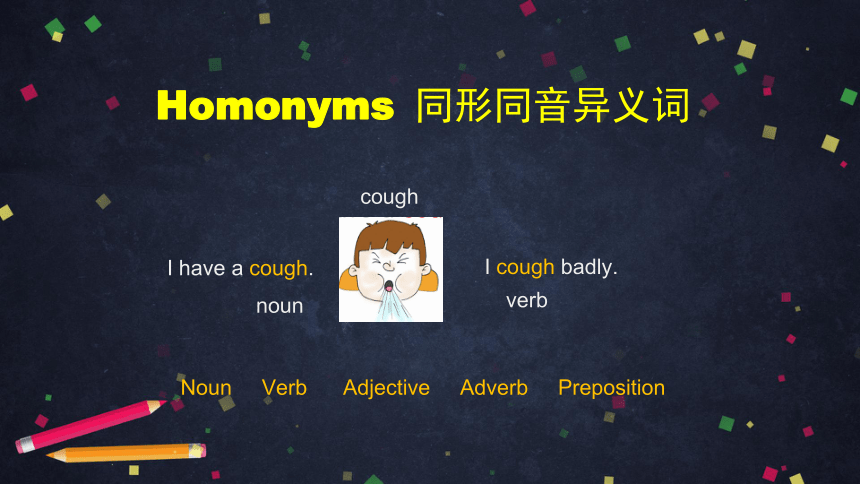
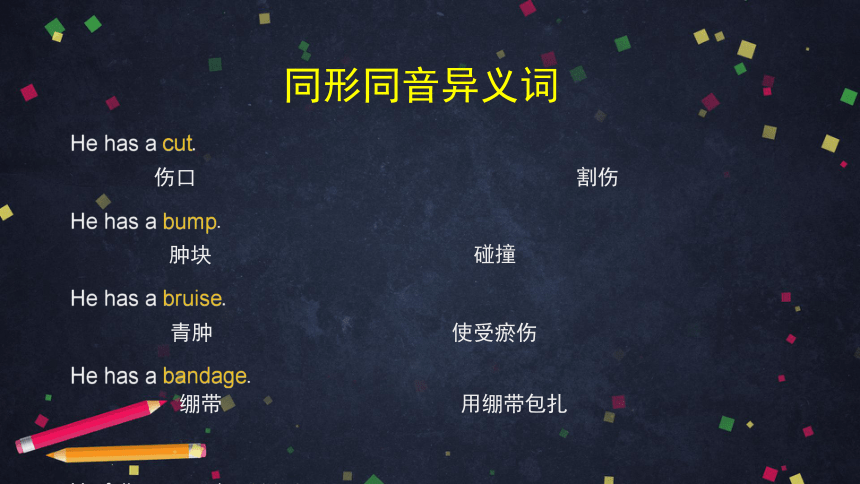
文档简介
(共33张PPT)
Unit 1 What’s the matter?
Part 4
初二年级 英语
Language Goals
By the end of the class, the students will be able to
know how to express health problems and give advice with “should”;
understand reflexive pronouns;
know some common homonyms.
Let’s watch!
Let’s check!
bandaid bloodynose broken arm bruise bump cough cut diarrhea fever hay fever headache IV
symptoms and treatments
Grammar Focus
What’s the matter? I have a stomachache. You shouldn’t eat so much next time.
What’s the matter with Ben? He hurt himself. He has a sore back. He should lie down and rest.
Do you have a fever? Yes, I do./ No, I don’t./ I don’t know.
Does he have a toothache? Yes, he does. He should see a dentist and get an X- ray.
What should she do? She should take her temperature.
Should I put some medicine on it? Yes, you should./ No, you shouldn’t.
RDFZ: 内容字号不低于24,特殊辅助性文字才是不低于18
How to Express Health Problems or Accidents?
have a cold, have a fever, have a cough, get a stomachache,
get a toothache…
1. have / get a(n) + 疾病名称
A: What’s the matter?
B: I have a cold.
A: Why are you late for class?
B: I get a stomachache and I can
only walk slowly.
How to Express Health Problems or Accidents?
2. be / feel + 形容词,表示不适
be/ feel tired, be/ feel sick, be/ feel dizzy, head feels hot…
A: Are you OK?
B: No, I feel sick.
A: What’s the matter with Ben?
B: He is tired.
How to Express Health Problems or Accidents?
get hurt, get cut in the hand, get hit by a ball…
A: Little Tom is crying.
B: Oh, he got hurt.
A: I don’t like cooking because I
don’t want to get cut in the hand.
B: Don’t worry.
3. get + 动词的过去分词 表示受伤
How to Express Health Problems or Accidents?
4. take/ get 表达诊治/服用
take one’ s temperature, take some medicine,
take an injection, take/ get an X-ray (a picture)
A: What should she do?
B: She should take her temperature.
How to Express Health Problems or Accidents?
see the dentist/ doctor, go to a doctor, go to (the) hospital…
5. see/ go to 表达就医
A: Does he have a toothache?
B: Yes. He should see a dentist and get an X- ray.
Homonyms 同形同音异义词
cough
I cough badly.
I have a cough.
noun
verb
Noun Verb Adjective Adverb Preposition
同形同音异义词
He has a cut.
He has a bump.
He has a bruise.
He has a bandage.
He fell over and cut his knees.
He bumped into the wall in the dark.
He bruised his face badly.
She bandaged the boy’s hand.
伤口
割伤
肿块
碰撞
青肿
使受瘀伤
绷带
用绷带包扎
同形同音异义词
Lucy caught the ball in one hand.
抓住
No one wants to catch COVID-19 (新冠肺炎).
感染
Aron’s arm was caught under a 360-kilo rock that fell on him when he was climbing by himself in the mountains.
困住
同形同音异义词
Take two tablets(药片) before bedtime.
食用;饮用
Tom took his sister to the hospital.
携带;带领
As a mountain climber, Aron is used to taking risks.
承担;接受
Grammar Focus
What’s the matter? I have a stomachache. You shouldn’t eat so much next time.
What’s the matter with Ben? He hurt himself. He has a sore back. He should lie down and rest.
Do you have a fever? Yes, I do./ No, I don’t./ I don’t know.
Does he have a toothache? Yes, he does. He should see a dentist and get an X- ray.
What should she do? She should take her temperature.
Should I put some medicine on it? Yes, you should./ No, you shouldn’t.
Modal Verbs 情态动词
情态动词(Modal verbs)本身有一定的词义,是表示语气的单词。但是不能独立作谓语,只能和动词原形一起构成谓语。情态动词用在行为动词前,表示说话人对这一动作或状态的看法或主观设想。情态动词虽然数量不多,但用途广泛。
can, may must, shall, should, will, need, had better…
How to Use Modal Verbs?
I can see you. Come here.
He must have been away.
What can I do for you?
1. 情态动词位于谓语动词/助动词/主语前
2. 情态动词后面需要跟动词原形。
You have to go home.
Lucy should wash her hands after class.
How to Use Modal Verbs?
I can play the piano well.
He can play the piano well.
They can play the piano well.
3. 情态动词没有人称变化。
4. 情态动词变否定直接在该情态动词后加not。
They need not (needn’t) arrive there so early.
You should not (shouldn’t) eat in class.
Jack cannot (can’t) carry the heavy box.
The Functions of Modal Verbs
能力
客观可能性
允许;要求
建议
义务
逻辑推测
Can you swim?
The hall can hold 500 people.
Shall we go shopping tomorrow?
You should go back home.
I must finish my homework today.
It’s 10 o’ clock. He must be sleeping.
情态动词表示建议
could- should- must
A: I don’t like my computer.
B: Well, you could buy a new one!
Which T-shirt should I wear? They are both cool.
You are sick. You should go to the doctor.
You must pay attention to the instruction when you
visit the museum.
Grammar Focus
What’s the matter? I have a stomachache. You shouldn’t eat so much next time.
What’s the matter with Ben? He hurt himself. He has a sore back. He should lie down and rest.
Do you have a fever? Yes, I do./ No, I don’t./ I don’t know.
Does he have a toothache? Yes, he does. He should see a dentist and get an X- ray.
What should she do? She should take her temperature.
Should I put some medicine on it? Yes, you should./ No, you shouldn’t.
Reflexive Pronouns 反身代词
第一人称 第二人称 第三人称
单数 myself yourself himself
herself
itself
复数 ourselves yourselves themselves
How to Use Reflexive Pronouns?
My little sister is talking to herself.
John taught himself English.
I’m not myself today.
Just be yourselves.
I made the paper flower myself.
You had better ask the teacher yourself.
宾语
表语
同位语
强调
How to Use Reflexive Pronouns?
昨天Lily伤到了自己。
Lily hurt herself yesterday.
你可以自我介绍一下吗?
Can you introduce yourself?
她今天不舒服。
She is not herself today.
他本人是个老师。
He himself is a teacher.
反身代词的搭配
自学
过得愉快
随便吃/随便用
身体或精神状态
自言自语
致力于
teach oneself
enjoy oneself
help oneself
be/feel/seem/look oneself
talk/speak to oneself
devote oneself
4a Let’s finish the conversation.
1. A: I hurt when I played basketball yesterday. What I do?
B: You see a doctor and get an X-ray.
2. A: the matter?
B: My sister and I sore throats. we go to school?
A: No, you .
3. A: Mike a fever?
B: No, he . He a stomachache.
A: He drink some hot tea.
myself
should
should
What’s
have
Should
shouldn’t
Does
have
doesn’t
has
should
4b Let’s choose the best advice for these health problems. Do you have better advice?
1. Jenny cut herself.
She should (get an X-ray/ put some medicine on the cut).
My advice:
2. Kate has a toothache.
She should (see a dentist/ get some sleep).
My advice:
She should put a bandage on the cut.
She should brush her teeth more carefully.
4b Let’s choose the best advice for these health problems. Do you have better advice?
3. Mary and Sue have colds.
They shouldn’t (sleep/ exercise).
My advice:
4. Bob has a sore back.
He should (lie down and rest/ take his temperature).
My advice:
They shouldn’t stay up late.
He should take some medicine.
Self- check 3 Let’s give advice for these people.
1. Problem: Alan cut himself.
Advice:
2. Problem: Cindy has a headache.
Advice:
3. Problem: My cousins have bad colds.
Advice:
4. Problem: Jack hurt his back playing volleyball.
Advice:
He should put a bandage on the cut.
She should stop working and have a rest.
They should take their temperature.
He should stop playing and lie down.
Please translate the sentences.
1. 我昨天伤到了自己。
2. 他们需要靠自己去医院。
3. 你自己应该量一下体温。
I hurt myself yesterday.
They need go to the hospital by themselves.
You should take your temperature yourself.
Please translate the sentences.
1. He is very kind.
2. I can’t take that kind of medicine.
3. I don’t feel very well.
4. John can play the piano well.
5. Can the light hurt my eyes?
6. Are there light winds today?
他非常友善。
我不能吃那种药。
我觉得身体不太舒服。
约翰可以把钢琴弹地很好。
光会伤到我的眼睛吗?
今天有微风吗?
Homework
I 请尽可能多地找出你见过的同形同音异义词并记录下来。
II 请完成课后练习题(详见《学习任务单》中的课后作业)。
THANKS!
Unit 1 What’s the matter?
Part 4
初二年级 英语
Language Goals
By the end of the class, the students will be able to
know how to express health problems and give advice with “should”;
understand reflexive pronouns;
know some common homonyms.
Let’s watch!
Let’s check!
bandaid bloodynose broken arm bruise bump cough cut diarrhea fever hay fever headache IV
symptoms and treatments
Grammar Focus
What’s the matter? I have a stomachache. You shouldn’t eat so much next time.
What’s the matter with Ben? He hurt himself. He has a sore back. He should lie down and rest.
Do you have a fever? Yes, I do./ No, I don’t./ I don’t know.
Does he have a toothache? Yes, he does. He should see a dentist and get an X- ray.
What should she do? She should take her temperature.
Should I put some medicine on it? Yes, you should./ No, you shouldn’t.
RDFZ: 内容字号不低于24,特殊辅助性文字才是不低于18
How to Express Health Problems or Accidents?
have a cold, have a fever, have a cough, get a stomachache,
get a toothache…
1. have / get a(n) + 疾病名称
A: What’s the matter?
B: I have a cold.
A: Why are you late for class?
B: I get a stomachache and I can
only walk slowly.
How to Express Health Problems or Accidents?
2. be / feel + 形容词,表示不适
be/ feel tired, be/ feel sick, be/ feel dizzy, head feels hot…
A: Are you OK?
B: No, I feel sick.
A: What’s the matter with Ben?
B: He is tired.
How to Express Health Problems or Accidents?
get hurt, get cut in the hand, get hit by a ball…
A: Little Tom is crying.
B: Oh, he got hurt.
A: I don’t like cooking because I
don’t want to get cut in the hand.
B: Don’t worry.
3. get + 动词的过去分词 表示受伤
How to Express Health Problems or Accidents?
4. take/ get 表达诊治/服用
take one’ s temperature, take some medicine,
take an injection, take/ get an X-ray (a picture)
A: What should she do?
B: She should take her temperature.
How to Express Health Problems or Accidents?
see the dentist/ doctor, go to a doctor, go to (the) hospital…
5. see/ go to 表达就医
A: Does he have a toothache?
B: Yes. He should see a dentist and get an X- ray.
Homonyms 同形同音异义词
cough
I cough badly.
I have a cough.
noun
verb
Noun Verb Adjective Adverb Preposition
同形同音异义词
He has a cut.
He has a bump.
He has a bruise.
He has a bandage.
He fell over and cut his knees.
He bumped into the wall in the dark.
He bruised his face badly.
She bandaged the boy’s hand.
伤口
割伤
肿块
碰撞
青肿
使受瘀伤
绷带
用绷带包扎
同形同音异义词
Lucy caught the ball in one hand.
抓住
No one wants to catch COVID-19 (新冠肺炎).
感染
Aron’s arm was caught under a 360-kilo rock that fell on him when he was climbing by himself in the mountains.
困住
同形同音异义词
Take two tablets(药片) before bedtime.
食用;饮用
Tom took his sister to the hospital.
携带;带领
As a mountain climber, Aron is used to taking risks.
承担;接受
Grammar Focus
What’s the matter? I have a stomachache. You shouldn’t eat so much next time.
What’s the matter with Ben? He hurt himself. He has a sore back. He should lie down and rest.
Do you have a fever? Yes, I do./ No, I don’t./ I don’t know.
Does he have a toothache? Yes, he does. He should see a dentist and get an X- ray.
What should she do? She should take her temperature.
Should I put some medicine on it? Yes, you should./ No, you shouldn’t.
Modal Verbs 情态动词
情态动词(Modal verbs)本身有一定的词义,是表示语气的单词。但是不能独立作谓语,只能和动词原形一起构成谓语。情态动词用在行为动词前,表示说话人对这一动作或状态的看法或主观设想。情态动词虽然数量不多,但用途广泛。
can, may must, shall, should, will, need, had better…
How to Use Modal Verbs?
I can see you. Come here.
He must have been away.
What can I do for you?
1. 情态动词位于谓语动词/助动词/主语前
2. 情态动词后面需要跟动词原形。
You have to go home.
Lucy should wash her hands after class.
How to Use Modal Verbs?
I can play the piano well.
He can play the piano well.
They can play the piano well.
3. 情态动词没有人称变化。
4. 情态动词变否定直接在该情态动词后加not。
They need not (needn’t) arrive there so early.
You should not (shouldn’t) eat in class.
Jack cannot (can’t) carry the heavy box.
The Functions of Modal Verbs
能力
客观可能性
允许;要求
建议
义务
逻辑推测
Can you swim?
The hall can hold 500 people.
Shall we go shopping tomorrow?
You should go back home.
I must finish my homework today.
It’s 10 o’ clock. He must be sleeping.
情态动词表示建议
could- should- must
A: I don’t like my computer.
B: Well, you could buy a new one!
Which T-shirt should I wear? They are both cool.
You are sick. You should go to the doctor.
You must pay attention to the instruction when you
visit the museum.
Grammar Focus
What’s the matter? I have a stomachache. You shouldn’t eat so much next time.
What’s the matter with Ben? He hurt himself. He has a sore back. He should lie down and rest.
Do you have a fever? Yes, I do./ No, I don’t./ I don’t know.
Does he have a toothache? Yes, he does. He should see a dentist and get an X- ray.
What should she do? She should take her temperature.
Should I put some medicine on it? Yes, you should./ No, you shouldn’t.
Reflexive Pronouns 反身代词
第一人称 第二人称 第三人称
单数 myself yourself himself
herself
itself
复数 ourselves yourselves themselves
How to Use Reflexive Pronouns?
My little sister is talking to herself.
John taught himself English.
I’m not myself today.
Just be yourselves.
I made the paper flower myself.
You had better ask the teacher yourself.
宾语
表语
同位语
强调
How to Use Reflexive Pronouns?
昨天Lily伤到了自己。
Lily hurt herself yesterday.
你可以自我介绍一下吗?
Can you introduce yourself?
她今天不舒服。
She is not herself today.
他本人是个老师。
He himself is a teacher.
反身代词的搭配
自学
过得愉快
随便吃/随便用
身体或精神状态
自言自语
致力于
teach oneself
enjoy oneself
help oneself
be/feel/seem/look oneself
talk/speak to oneself
devote oneself
4a Let’s finish the conversation.
1. A: I hurt when I played basketball yesterday. What I do?
B: You see a doctor and get an X-ray.
2. A: the matter?
B: My sister and I sore throats. we go to school?
A: No, you .
3. A: Mike a fever?
B: No, he . He a stomachache.
A: He drink some hot tea.
myself
should
should
What’s
have
Should
shouldn’t
Does
have
doesn’t
has
should
4b Let’s choose the best advice for these health problems. Do you have better advice?
1. Jenny cut herself.
She should (get an X-ray/ put some medicine on the cut).
My advice:
2. Kate has a toothache.
She should (see a dentist/ get some sleep).
My advice:
She should put a bandage on the cut.
She should brush her teeth more carefully.
4b Let’s choose the best advice for these health problems. Do you have better advice?
3. Mary and Sue have colds.
They shouldn’t (sleep/ exercise).
My advice:
4. Bob has a sore back.
He should (lie down and rest/ take his temperature).
My advice:
They shouldn’t stay up late.
He should take some medicine.
Self- check 3 Let’s give advice for these people.
1. Problem: Alan cut himself.
Advice:
2. Problem: Cindy has a headache.
Advice:
3. Problem: My cousins have bad colds.
Advice:
4. Problem: Jack hurt his back playing volleyball.
Advice:
He should put a bandage on the cut.
She should stop working and have a rest.
They should take their temperature.
He should stop playing and lie down.
Please translate the sentences.
1. 我昨天伤到了自己。
2. 他们需要靠自己去医院。
3. 你自己应该量一下体温。
I hurt myself yesterday.
They need go to the hospital by themselves.
You should take your temperature yourself.
Please translate the sentences.
1. He is very kind.
2. I can’t take that kind of medicine.
3. I don’t feel very well.
4. John can play the piano well.
5. Can the light hurt my eyes?
6. Are there light winds today?
他非常友善。
我不能吃那种药。
我觉得身体不太舒服。
约翰可以把钢琴弹地很好。
光会伤到我的眼睛吗?
今天有微风吗?
Homework
I 请尽可能多地找出你见过的同形同音异义词并记录下来。
II 请完成课后练习题(详见《学习任务单》中的课后作业)。
THANKS!
同课章节目录
- Unit 1 What's the matter?
- Section A
- Section B
- Unit 2 I'll help to clean up the city parks.
- Section A
- Section B
- Unit 3 Could you please clean your room?
- Section A
- Section B
- Unit 4 Why don't you talk to your parents?
- Section A
- Section B
- Unit 5 What were you doing when the rainstorm came
- Section A
- Section B
- Review of Units 1-5
- Unit 6 An old man tried to move the mountains.
- Section A
- Section B
- Unit 7 What's the highest mountain in the world?
- Section A
- Section B
- Unit 8 Have you read Treasure Island yet?
- Section A
- Section B
- Unit 9 Have you ever been to a museum?
- Section A
- Section B
- Unit 10 I've had this bike for three years.
- Section A
- Section B
